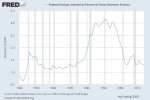Ganesh
DP Veteran
- Joined
- Jun 15, 2014
- Messages
- 2,028
- Reaction score
- 1,329
- Gender
- Undisclosed
- Political Leaning
- Undisclosed
The need to acquire money has nothing to do with the government taking away my money. If the government took nothing from me I have more to spend.
No, you wouldn't. You would be paying for for-profit, private companies to provide the services you now get from the public sector. Do you think these folks are going to give you a discount out of the goodness of their hearts?
Interest rates help control inflation. As for the control of uses, all government has to do is limit the products it wants to control.
Interest rates are one economic tool, but are not sufficient in all cases for good economic management.
If there was no public direction in the use of resources, it would be a race for the cheap and easy, and we would have more dirty coal plants, unsafe nuclear reactors, gas guzzling cars, and questionable food and drug products, among other things.
I rest my case as I said above and now you agree, I suggest to cut all taxes as you claim the national debt means nothing. In which case the government can borrow all it wants with never a consequence.
Nobody has said the national debt means nothing, but is is inherently different from personal debt. Money that leaves your household, leaves. It is gone. Hopefully you have received good value for it, but it is gone. Public "spending" is actually redistribution of resources within society (except for some small items, like foreign aid). A tiny bit of your tax money becomes a tiny bit of someone else's school, or a few molecules of an F-35 fighter. The trick is of course to move things about in the best fashion, something open to a large amount of subjectivity. Individuals also do not have the ability to create money, manipulate the money supply, inflation, and foreign exchange rates, or do other things that vastly alter the value and meaning of any "debt" they may hold.

